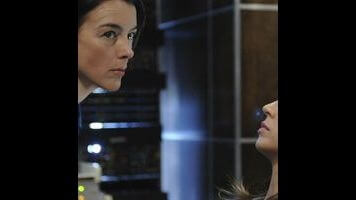Dollhouse: "Instinct"

Here was my first thought on “Instinct,” the second episode of this season and the Dollhouse debut for the writing team of Tara Butters and Michele Fazekas: “Uh oh.” Having abandoned the adventure-of-the-week format of the first five episodes of the series for a more ambitious, wide-reaching, novelistic style—the cancer-curing “Man On The Street” being the line of demarcation—“Instinct” appeared to be a big step backward. After getting to know (and frankly, become more interested in) the characters not played by Eliza Dushku, the episode was now taking us back to an Echo-centric hour that barely goes anywhere in the overall arc of the show and more or less has us hitting the reset button as soon as it’s over.
Here’s my second thought on “Instinct,” once it actually unfolded: “Yes, it’s like those hit-or-miss early episodes, but mostly much better.” The themes are richer and intricately connected with the overall operation of the Dollhouse, and the writing is sharper, too, with at least three or four laugh-out-loud lines that also function as more than just throwaway quips. (I’ll get to those as we go along.) And until a climax that lapsed into generic thriller material—with the cut electricity, the baby-in-peril-by-kitchen-knife, et al.—it wasn’t the risible Hand That Rocks The Cradle threatened by the promo. It was a whole lot headier than that, thank God.
Basically, the episode was an extension of the Patton Oswalt fantasy in “Man On The Street” and a severely abridged version of the Dawn situation from the fifth season of Buffy. The client (the Oswalt figure in this scenario) is a wealthy widow with an infant boy who has hired Dollhouse to provide him with a mother who can take care of his child. We find out later—though it’s not hard to figure out right away—that the man’s wife died during delivery and he can’t bring himself to love his baby son just yet, because he holds him responsible for her passing. One of the interesting things about the client is that unlike Oswalt’s character in “Man On The Street,” his interest in Echo’s services is more practical than fantastical. He doesn’t seem to care about extracurricular activities; he just wants someone to nurture the baby in a way that he’s incapable of managing. Despite his shifty, secretive, baby-dodging behavior in the early scenes—all a big red herring anyway—the guy isn’t so resentful of what happened to his wife that he doesn’t care about doing right by his newborn son. Sweet fella.
In this scenario, Echo’s role is similar to Buffy and company’s feelings about Dawn in Buffy Season Five. Dawnie isn’t really Buffy’s sister, but Buffy feels that sibling bond all the same, which is perhaps just an intensified variant on what Dollhouse does all the time. The “actives,” for as long as they’re out in the field, fully embody their imprint and all the turbulent emotions that go along with it. The difference this time is that Echo has become a mother and that maternal bond—as we’re told by Topher in a groan-inducing fashion—is more powerful than a simple wipe can conquer.
Truth be told, I found the concept of Echo’s attachment to the baby much more compelling than the misunderstandings that lead to the scheming and fleeing and mayhem. With Miracle Laurie’s November (mmm…Miracle Laurie) turning up as a potent reminder of what the dolls have to go through, we’re again forced to confront the trauma that these jobs visit upon an active. At the end of the episode, a still-unwiped Echo tries to process the horrors of really feeling that she’s someone who she’s not, and then still concludes that she prefers feeling something intense and terrible than feeling nothing at all. Laurie’s character seems more settled and “no sad” after leaving Dollhouse, but her life also lacks purpose and dimension—or so it seems for now, anyway.
Another big reason I liked “Instinct”: It’s often very funny and continues Topher’s unlikely hot streak. The pre-credits scene with Topher and Ballard was particularly good, with Topher treating the new handler as a lunkhead who can’t possibly conceive of his brilliance. After introducing the concept of coding the brain to make changes to the body—a breakthrough with widespread potential, from fighting cancer to telekinesis—Topher quips, “I don’t want to use the word ‘genius,’ but I’d be okay if you wanted to.” And then there’s this spectacular metaphor: “The human mind is like Van Halen: If you keep pulling out one piece and replacing it, it degenerates.”
 Keep scrolling for more great stories.
Keep scrolling for more great stories.
